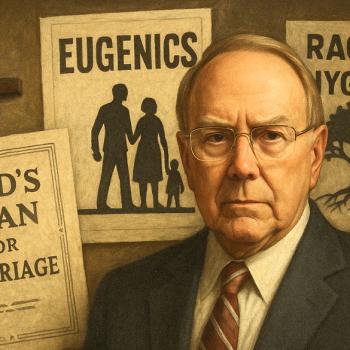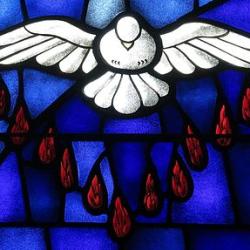• I agree with Richard Ostling here: “By coincidence, both party leaders [in the House of Representatives] are now Baptists. … There would be good feature potential in comparing the two Baptists’ congregations.”
Probational Acting Speaker Kevin McCarthy is a member of Valley Baptist, a large white Southern Baptist congregation in Bakersfield. His pastor, Roger Spradlin, is a former chair of the SBC’s national executive committee and a graduate of Criswell College — named for its founder, the segregationist Dallas pastor W.A. Criswell.
Democratic Minority Leader Hakeem Jeffries is a lifelong member of Cornerstone Baptist — a Black Baptist congregation thriving in Brooklyn since 1917.
Both Baptist churches describe themselves as “Bible-based,” looking to “the Word of God – originally given by God, divinely inspired, infallible, entirely trustworthy, and the only supreme authority in all matters of faith and conduct. (II Timothy 3:16)” That quote is from Cornerstone’s website, but I think Pastor Spradlin and the other folks at Valley Baptist would say “Amen” to that language.
This is what makes the “Baptist diversity” Ostling highlights so interesting. The theological language of white Baptists and Black Baptists is often identical. But the meaning of that language is often radically different.
How that meaning differs and why that meaning differs isn’t a mystery. And once you acknowledge that — the how and why of the way those different meanings came to be, it’s also obvious which one of those meanings is better.
• Here’s the news from my next-door neighbors in Lancaster County: “Conservative Christian Rifts Spreading Like Cracked Glass.”
Doug Mastriano’s white-Christian-nationalist campaign for Pennsylvania governor brought together various factions of conservative white Christians in Lancaster. And when they all came together in one room, they realized they hate each other almost as much as they hate feminists, gays, Jews, and Black people.
When you’re dealing with different groups who each base their self-understanding and sense of identity on the idea that “We Alone Are The Real, True Christians Standing For Truth Against The Apostates,” then they’re bound to start fighting almost as soon as they’re introduced. Their shared commitment to white supremacy and to theocratic postmillennialism isn’t enough to overcome that. They were briefly able to set aside their differences to hold prayer rallies for Mastriano, or to come together to attack police officers in the Jan. 6 riots. But now they’re at each other’s throats.
Here in Lancaster, the Neo-Confederate (and Nazi-adjacent) Reconstructionists have declared war on the neo-charismatic New Apostolic Reformation.

• Serial convert and white conservative Rod Dreher is moving to Budapest because, he says — quoting Michel Houllebecq — “There is no Israel for people like us.” What does he mean by “people like us”? Oh, you know what he means.
I’m hoping this becomes a trend and that all of the American admirers of Viktor Orbán’s white nationalist authoritarianism decide to join Dreher in moving there.
• Rick Pidcock interviews Cynthia Vacca Davis, author of Intersexion: A Story of Faith, Identity, and Authenticity, which tells the story of Danny, an intersex person who was raised in conservative white evangelicalism. As Pidcock notes, that’s not a great context to grow up in for someone who’s intersex:
In an article at The Gospel Coaltion, Denny Burk called intersex people a “morally confounding situation,” an “ethical challenge,” and a “problem.” Rather than offering any helpful thoughts, Burk responded by lamenting progressive and liberal Christians committing a “sustained assault on what the Bible teaches about gender and sexuality” in a “Bible-ignoring zeitgeist.”
It is monstrous to raise a child telling them that their very existence constitutes a “morally confounding situation,” an “ethical challenge,” and a “problem.” But then it’s also monstrous to say such a thing to a fully grown adult.
This bit of advice from Davis seems wise:
Statistically, almost everyone knows someone who is intersex, but most will never know that because it’s too dangerous for an intersex person to be vulnerable and transparent unless they have a reasonable expectation that you are someone they can trust. If you have a history of having strong, negative, anti-LGBTQ opinions, you likely do know intersex people — they just aren’t telling you about it.
• Mondo Cozmo’s “Electrify My Love” — quoted in the title of this post — checks a lot of boxes for me, what with the literally apocalyptic lyrics and the fact that Josh Ostrander is from Philly. But it’s also just a really great song (even if, or because, the melody of the verses seems to borrow from Colbie Caillat):
















